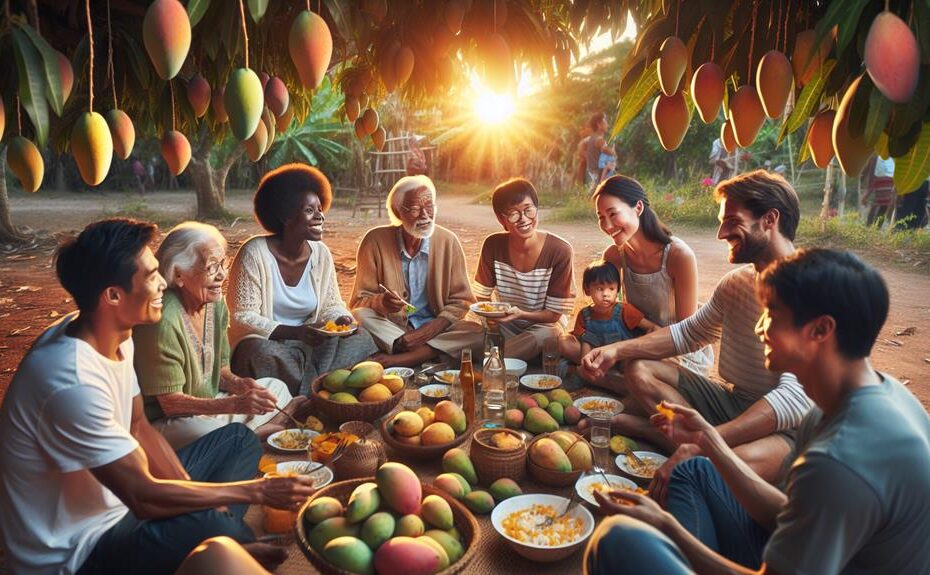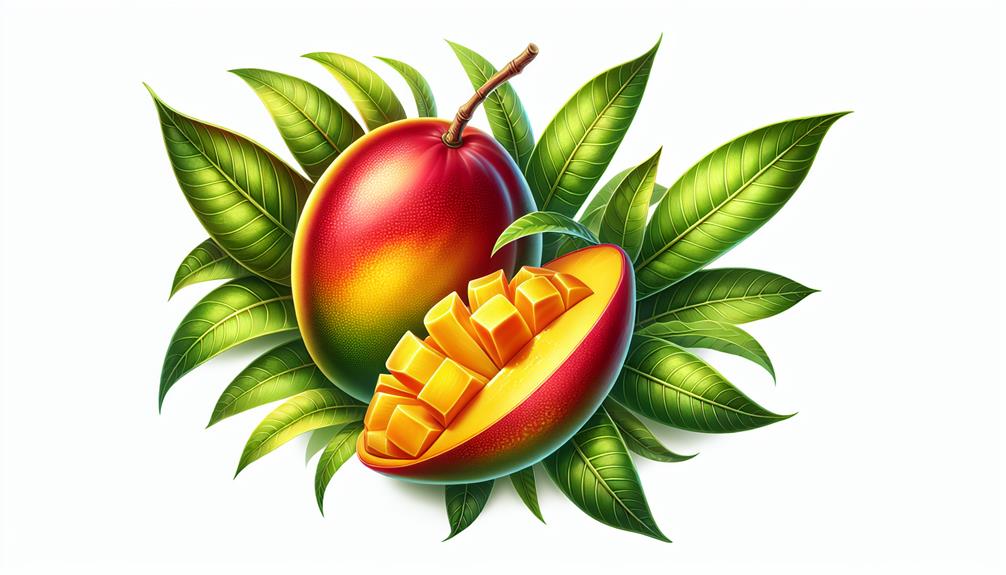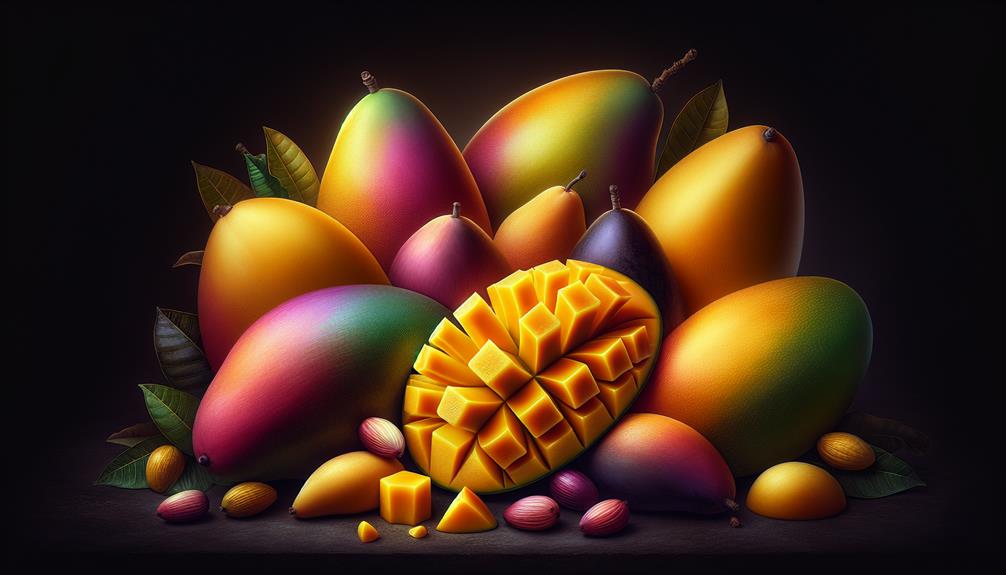Investigating mango symbolism across various cultures reveals a captivating tapestry of meanings and representations that go beyond mere fruit. From ancient myths to modern interpretations, the mango's significance resonates deeply with humanity's collective consciousness, offering insights into our shared values and beliefs. As you explore the diverse cultural narratives and traditions surrounding mango symbolism, you'll unearth a world where this tropical fruit transcends its physical form to embody profound spiritual, social, and artistic dimensions, inviting reflection on the universal themes it embodies.
Key Takeaways
- Mangoes symbolize abundance, fertility, and immortality in diverse cultures.
- Spiritual and religious traditions associate mangoes with divine union, tranquility, and prosperity.
- Art and literature depict mangoes as symbols of richness, transformation, and indulgence.
- Mangoes feature prominently in cultural festivals and ceremonies worldwide.
- Mango folklore ties the fruit to love, rebirth, wisdom, unity, and deep mythological meanings.
Origins of Mango Symbolism
The origins of mango symbolism can be traced back to ancient civilizations where the fruit held deep cultural significance in various rituals and traditions. Historical significance is evident as mangoes have been cultivated for over 4,000 years, with references found in ancient texts and artworks from India, Southeast Asia, and beyond. In these cultures, mangoes were not merely fruits but symbols of abundance, fertility, and even immortality. The cultural meanings attached to mangoes varied widely, with some viewing them as a symbol of love and prosperity, while others associated them with royalty and divine blessings.
Mythological connections further enriched the symbolism of mangoes, with ancient beliefs intertwining the fruit with legends of gods and goddesses. In Hindu mythology, the mango tree is considered sacred, believed to grant wishes and bring good fortune. Similarly, in Buddhist traditions, mangoes symbolize enlightenment and spiritual awakening. These mythological ties added layers of meaning to the cultural significance of mangoes, making them revered symbols in various ancient societies.
Spiritual and Religious Associations
With deep roots in spiritual and religious traditions, mango symbolism transcends mere fruit imagery to embody profound meanings across various cultures and belief systems. Mango rituals and beliefs vary widely, showcasing the fruit's significance in spiritual practices and myths. In Hinduism, the mango is often associated with love and fertility, symbolizing the divine union between gods. In Buddhist traditions, the mango tree is believed to be the tree of the gods, representing tranquility and enlightenment. Some Indigenous cultures in South America view the mango as a symbol of abundance and prosperity, incorporating it into rituals for blessings and good fortune.
Across different regions, mangoes feature in various spiritual practices and myths. In certain African societies, mango trees are considered sacred and are believed to house ancestral spirits. In Caribbean folklore, the mango is linked to stories of creation and the gods. These diverse interpretations highlight the mango's versatility in conveying spiritual and religious meanings that resonate deeply with believers worldwide.
Mango Symbolism in Art and Literature
Exploring the world of art and literature reveals a rich tapestry of mango symbolism, weaving cultural significance into visual and written expressions. Symbolic representations of mangoes in art and literature vary across cultures, each providing a unique perspective on the fruit's meaning. In Western art, mangoes are often depicted as exotic and luxurious, symbolizing wealth and indulgence. Conversely, in Eastern artistic interpretations, mangoes can represent fertility, love, and even spiritual enlightenment.
- Vibrant Imagery: Artists use vivid colors and intricate details to capture the lusciousness of mangoes, evoking a sense of desire and abundance.
- Emotional Depth: Writers infuse mango symbolism with emotions like longing, nostalgia, or even betrayal, creating a multi-layered reading experience.
- Cultural Context: Mangoes in art and literature serve as a bridge between past traditions and modern interpretations, showcasing the fruit's enduring relevance.
- Symbolic Transformation: Through artistic interpretations, mangoes can undergo symbolic transformations, shifting from mere fruit to powerful metaphors for life's complexities.
Cultural Traditions and Festivals
In various cultural traditions and festivals around the world, mangoes play a significant role, symbolizing diverse meanings and values within different communities. Traditional celebrations often revolve around the mango harvest, marking the abundance of this fruit and the start of a new season. These festivities are rich in symbolism and are often accompanied by harvest rituals that honor the earth's generosity.
| Culture | Mango Tradition |
|---|---|
| Indian | Mango leaves adorn doorways during festivals like Diwali, symbolizing prosperity and good fortune. Mango lassi is a popular drink during celebrations. |
| Filipino | The Mango Festival in Zambales showcases various mango varieties and features dishes like mango salad and mango float. Mangoes are also part of traditional ceremonies. |
| Mexican | In Mexico, mangoes are incorporated into both sweet and savory dishes, with mango salsa being a beloved culinary creation. The Mango Festival in Nayarit celebrates this fruit in all its forms. |
| Thai | Thailand's Songkran festival includes mango sticky rice as a staple dessert, symbolizing sweetness and unity during this important cultural event. |
Mango Symbolism in Folklore
Mango symbolism in folklore transcends mere fruit reverence, delving into intricate tales that weave cultural beliefs and values into the very essence of this tropical treasure. In various cultures around the world, mangoes hold deep mythological connections and are intertwined with traditional beliefs. Folklore interpretations of mangoes go beyond their physical attributes, attributing symbolic meanings that resonate with the human experience.
- The mango tree is often seen as a symbol of love and fertility, with its lush foliage and sweet fruits representing abundance and prosperity.
- In some legends, the mango is linked to themes of transformation and rebirth, symbolizing the cycle of life and death.
- Mangoes are sometimes associated with wisdom and knowledge in folklore, depicted as a fruit that grants insight and enlightenment to those who partake of it.
- Across different cultures, the act of sharing a mango is laden with symbolism, signifying friendship, unity, and the bonds that connect people beyond borders.
Modern Interpretations and Global Impact
With globalization shaping cultural exchanges, the modern interpretations and global impact of mango symbolism have witnessed a dynamic evolution. Regarding environmental impact and sustainability, the mango industry faces challenges such as deforestation for mango cultivation. However, there is also a growing trend towards sustainable practices like organic farming and fair trade certifications, promoting eco-friendly mango production.
Economically, mangoes hold significant value in international trade relations. Countries like India, Mexico, and Thailand are major mango exporters, fostering economic ties worldwide. The demand for mangoes continues to rise, driving economic growth and creating employment opportunities in regions where mangoes are cultivated. This economic significance has led to collaborations between countries to enhance trade partnerships and ensure the quality and safety of mango exports.
In the modern context, mango symbolism not only reflects cultural meanings but also influences environmental practices and economic structures globally. By recognizing the importance of sustainability and trade relations, the impact of mango symbolism resonates beyond cultural boundaries, shaping a more interconnected world.
Frequently Asked Questions
Can Mango Symbolism Vary Between Different Regions or Countries?
Absolutely, mango symbolism can vary greatly between regions and countries. Regional differences in climate, history, and traditions shape cultural interpretations of mangoes. These variations enrich the symbolic significance of mangoes across diverse cultures.
Are There Any Superstitions Related to Mangoes in Certain Cultures?
In various cultures, mango superstitions and cultural beliefs exist, often intertwined with folklore and myths. These stories may vary greatly, but they all showcase the intriguing ways mangoes have been viewed and revered throughout history.
How Do Different Mango Varieties Influence Their Symbolism?
Different mango varieties influence their symbolism through a combination of flavor profiles, color symbolism, seasonal availability, and shape significance. Each variety carries unique characteristics that shape cultural meanings and perceptions around the world.
Is There a Specific Way to Incorporate Mango Symbolism in Daily Life?
Incorporating mango symbolism in daily life can be done through mango rituals and mango artistry. By integrating these elements into your routines and creative expressions, you can honor the cultural significance of mangoes.
Are There Any Taboos or Restrictions Related to Mango Symbolism?
In various cultures, taboos and restrictions exist around mango symbolism. These can vary based on cultural beliefs and traditional practices. It's crucial to be mindful and respectful of these nuances when engaging with mango symbolism.



